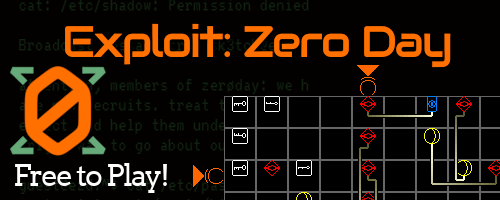
People often ask creative folks what their inspiration for a project was. It's a weird question to answer, because most projects have many inspirations. They evolve out of the primordial soup of your experiences and the state of the medium you're working in. Sometimes, though, there are specific works that serve as inspirations.
With Exploit: Zero Day, three big inspirations come to mind: World of Goo, Fallen London, and Uplink. These aren't the only games that inspired EZD, but they're the ones that loom largest in our minds.
World of Goo
I like the kind of thinking you have to do to play a puzzle game, but so many of them suffer from the flaw that they don't have any motivation to play extrinsic to the puzzles themselves. I have trouble playing games that have the same kind of puzzle over and over, like the excellent Snakebird. The levels begin to blur together and I get bored.
World of Goo doesn't have that problem. Its puzzles take place in a strange world of sentient goo balls, strung together by a bit of plot, odd recurring characters, and strange commentary on the nature of capitalist consumption, technological advancement, and beauty standards.
By imbuing the puzzles with a metaphor tied to a broader story and setting, you're motivated both by the excellent puzzles and by the world you're exploring. The game goes above and beyond by introducing new rules and strange environments as it goes along, even changing the puzzle type entirely for a brief segment when the plot warrants.
This approach has guided us in Exploit: Zero Day: our puzzles are designed to be integrated with the story and provide motivation for why you're solving them. We'd also like to have different rules and visual styles for different systems to provide new experiences and variety.
Fallen London
Story in games often serves as an enhancement or an afterthought, but in Fallen London story is the game. It's a strange, browser-based multiplayer game about a strange-horror alternate-history London that was stolen by bats and relocated into an immense cavern populated by devils, otherworldly beings, and retro-Victorian intrigue.
Fallen London serves as a touchstone for us; when we're trying to figure out the game rules around story, we nearly always ask "how does Fallen London do it?" Our game doesn't seem too similar on the surface; we have puzzles, level-sharing, and cyberpunk, but the "badges" that we use to track progression are heavily based on Fallen London's "qualities." The idea of tying story progression directly to story events using observable, collectible properties is inspired and inspirational.
We're also fans of how Fallen London doles out setting information in a gradual, ambient fashion and how it presents mysteries for dedicated fans to puzzle out. Both of these are things we hope to do in EZD's story.
Uplink
Uplink is the quintessential hacking game. Unlike EZD, this is a rather faithful simulation of hacking, although abstracted. You bypass system monitors, evade traces, erase logs, and steal data and money. While we replace all that nitty-gritty with puzzles, we very much love Uplink for the feel of the game.
Uplink feels like you're following a narrow thread of narrative through a large world. There are computer systems in Uplink with no relevance to the plot. In the game, most systems (maybe all systems!) are accessible from the beginning of the game, gated only by your technology and your personal knowledge.
We want to provide that feel with EZD, the feeling of swimming in a sea of intrigue and computer systems, working with players and non-player characters to forge a path through the internet in pursuit of your goals. While we take very little from Uplink's game design, but we are heavily inspired by how it makes you feel.
The Nature of Inspiration
We draw from countless sources. Beyond the three discussed above, we are inspired by Hackers, Snow Crash, Extrasolar, the principles behind our forum software Discourse, the System Shock series, Leverage, the meatspace tech industry, the "global chronicle" of the Mind's Eye Society, TouchTone, and the Deus Ex series, just to name a few.
The "cyber" in "cyberpunk" refers to self-governing interconnectedness, where components of a system intercommunicate to generate something more than the whole. The way in which ideas, motifs, and procedures are communicated through culture fits the cybernetic lens quite well. In this way, the interaction between our game and its inspirations is a demonstration of the cyberpunk ethos we're exploring.
Do you see influences on Exploit: Zero Day that we haven't mentioned? Has EZD or its predecessor Exploit inspired you? Tell us in the comments.




 View on YouTube
View on YouTube

